Labour’s Jess Phillips on transgender rights and why she’ll never throw minorities ‘under the bus’
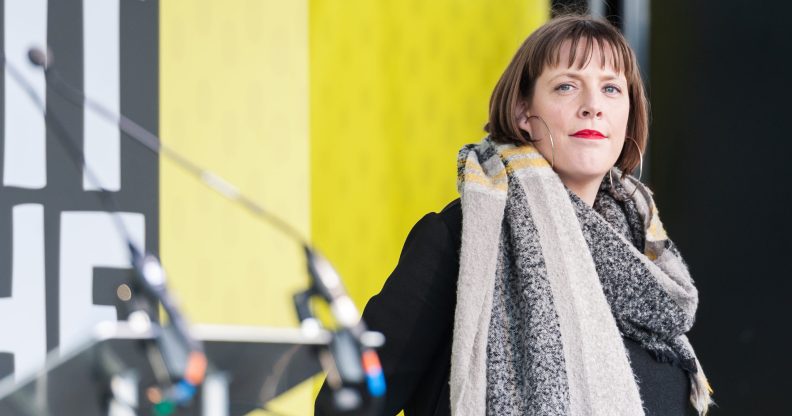
Jess Philips, Labour MP for Birmingham Yardley, quit the ballot to become the next leader of the party. (Wiktor Szymanowicz / Barcroft Media via Getty Images)
My name is Juno Dawson and I’m an author, journalist – and I’m a transgender woman. I’d admired Jess Phillips MP from afar for a couple of years on Twitter.
She was staunchly feminist, outspoken and unguarded. She was rare – a normal, working-class, human who’d somehow wound up in the rarified world of politics.
Only then, on November 16, 2017, she let me down.
She retweeted a notoriously anti-trans organisation who seek to bar women like me from single-sex spaces and revoke the hard earned rights of transgender people.
In her tweet, Phillips stated she found the group’s demands reasonable and that we needed a solution that suited both trans people and women.
You can guess what happened next: in typical Twitter style, trans allies piled on, bombarding Phillips with the phrase: ‘Trans women are women.’
It’s true, but I went one better and added a hugely patronising ‘Hun’ to the end of the sentence. Perhaps I was drunk or something.
Politicians on the liberal left are, without question, scrutinised more than those on the right: we expect Conservative politicians to be, well, conservative. Phillip’s tweet stung. It felt like a betrayal. The tweet was heralded by transphobic groups who seek to divide and foster suspicion around the trans community. Again, as has become customary, I mentally ‘cancelled’ Phillips and I wasn’t the only one.
Only later I noticed that Jess Phillips was working on legislation that would make the process of legally changing your gender easier, and was confused. We met in real life at a cross-party conference on the Gender Recognition Act, and we actually talked face-to-face. I was confused. She certainly didn’t strike me as a raging transphobe, and I realised I’d written Phillips off on the strength of one retweet.
Nonetheless, her reputation as a “TERF” has followed her since 2017, revived now that she’s in the running to be the next Labour leader. I wanted to sit down with Phillips and clarify her position on trans rights, sex workers, the Gender Recognition Act and what a Jess Phillips Labour Party would mean for LGBT+ rights.
Juno Dawson: Congratulations! You’ve made it through to the judge’s houses. How are you feeling about that?
Jess Phillips: I’m working on the riffs that I’ll do at judge’s houses because, you know… Which judge’s house would you want to go to?
I’d be Nicole Scherzinger.
Oh no, no, not for me.
No?
I think Simon is the big ticket. But I’ve made it through to the next stage of the Labour leadership race, so thank you very much. There’s lots of hurdles.
How are you feeling about that?
I feel pleased about it, I feel excited. I’m not going to pretend it’s all easy and that it isn’t stressful and that it isn’t a hard thing to do, especially with how I have to be away from home a lot.
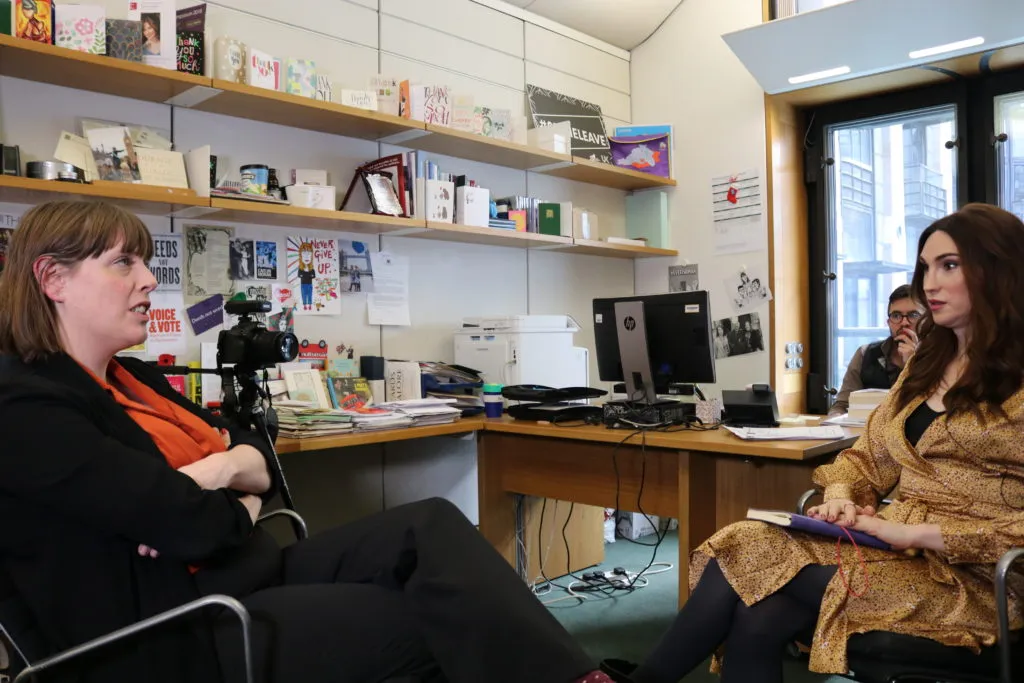
Labour lawmaker Jess Phillips (L) sat down with journalist Juno Dawson in the Houses of Parliament. (PinkNews)
But, most days, I just feel a bit like, “Well, this is really exciting to be able to go out and meet thousands of new people” – it’s what activists like doing. The best bit is not the bit in [Westminster], the best bit is always being out in the country.
So, what we’re going to do today for PinkNews is we are going to try to get a sense of what life would be like under a Jess Phillip Labour Party for LGBT+ people in particular.
Let’s start off with something I didn’t know about until today, and a lot of people might not know, which is in your personal history, you used to work with an LGBT+ charity. Can you tell us about that?
Yes I did! There is a charity in Birmingham called FreshWinds.
It was originally set up in the wake of the crisis around AIDS and HIV, not just as an advice and guidance service but also – and this is progress, this is something to be really celebrated – as a palliative care service. So, they offered alternative therapies for people who were dying, as well as help, support, housing, holistic support.
And then the charity grew to offer that support to people who were dying of other life-limiting diseases and had lots of different advice and guidance projects across Birmingham for all sorts of different groups.
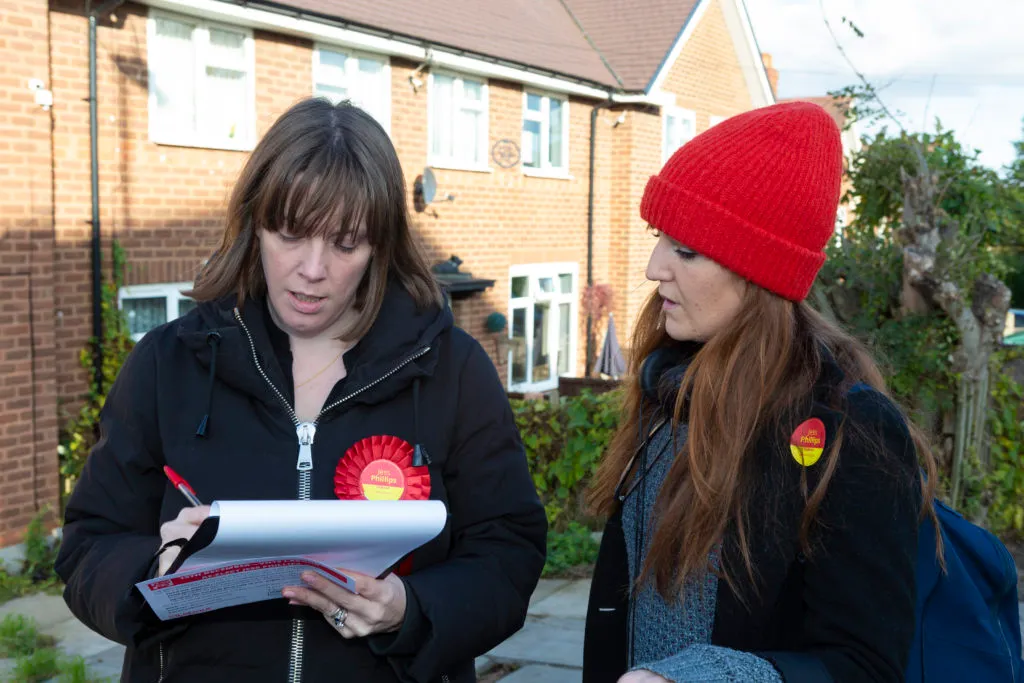
(Nicola Tree/ Getty Images)
But at the very heart of it, it was always sort of LGBT+ roots, and we worked in partnership with all of the big HIV and LGBT+ groups in Birmingham. We were always the biggest crowd on the Pride march.
There isn’t a Pride march in Birmingham that I haven’t attended until [last] year when they asked me to lead it. They asked me to lead it, to be one of the people who led the parade, and I was away on holiday. That’s the first time ever I have not gone!
There’ll be a Pride this year as well, get it in your diary now! So, we have met before and we’ve spoken online, so let’s let’s go back to when we first spoke, which I now refer to as our Twitter spat.
You’re going to have to remind me because I get into so many Twitter spats. [Laughs]
Hi Hun, you're fighting with the wrong person. I have no beef, just trying to converse instead of having a spat. The spat is dull and counter productive
— Jess Phillips MP (@jessphillips) November 18, 2017
https://twitter.com/junodawson/status/931808941402677248
When we first met in real life I apologised and you were, like, “I lost track of the spat.” I mean, it was a very minor one: I called you “hun”. Which, sometimes I still wake in the middle of the night thinking, “You can’t call a politician hun! That’s so patronising!”
Honestly, do not lose sleep about that!
We’ve all been called worse on Twitter!
I call people “bab” all the time, so…
In 2017, and this tweet has slightly haunted you and this is why I wanted to do this because I want to kind of get it dealt with forever so that we can actually look at your politics and you as a potential Labour leader.
In 2017, you retweeted a group, who I don’t want to name because I don’t want to give them any sort of publicity. It’s an organisation who exist solely to limit my movements in public and try remove the few rights that I do have. And in your retweet of this group, you said that you found their aims understandable, and that you wanted to speak to trans people and women.
Now at the time I was going through the Gender Recognition Act process and was legally a woman. I was really concerned that I wasn’t being recognised as a woman in your tweet, and this tweet is still being retweeted, we still both get replied to.
Do you understand why that tweet caused some concern?
Yeah, I mean, in hindsight… My husband always says if he had a superpower he’d have the power of hindsight, so that he’d never, ever, ever make a mistake in life… In hindsight, I can see why. But I suppose all I would say is that the specific thing you said, about saying ‘trans people and women’, it was totally unintended to suggest that there isn’t crossover in that group.
I suppose that there’s been so much heat around this debate and this conversation – it’s not even a debate, actually – that’s to put far too much into it.
There’s been so much heat, and as somebody who was part of the group of MPs who wrote the document around reforming self-ID, reforming health… It was much, much broader than the thing it’s been boiled down to actually… the trans rights report… The amount of heat that has been there, specifically online – people’s interactions in person have never, ever been that way.
But the idea that I was intending to say that you couldn’t be a woman and trans… I think what I was trying to suggest is we need to have a place where we all feel that we can talk, like we do in person, with all groups included. And it’s just the language thing, I suppose, and suggesting that what they were saying is reasonable is, I’ll have to say…
It was three years ago!
…on the face of everything what they’re asking for is for women to be able to have collectives and be part of the conversation.
There’s nothing innately unreasonable about those things. However, this was three years ago, and the toxicity where this has gone today, and what bothers me about it is intent.
In the debate about trans rights – there shouldn’t be any debate – but in this conversation about trans rights, people are frightened of making a mistake.
In the debate about trans rights – there shouldn’t be any debate – but in this conversation about trans rights, people are frightened of making a mistake.
And I remember when we were doing the inquiry [when the Women and Equalities Committee published a report calling for changes in attitudes to transgender people, led by Maria Miller], I kept thinking, “Oh, God”, because you’re being filmed all the time when you’re on the inquiry. Like, “What if I say the wrong thing?” Like, “Oh, God, what if I accidentally do something?”
And that is the thing that we have to take the heat out of because we’re never going to change people’s hearts and minds. It’s when people intend to be harmful.
100 per cent.
Actually, one of the groups I was thinking gets left out of this conversation is non-binary people. I’ve got a number of people I know very well and love very dearly who are non-binary, and I will accidentally sometimes say the wrong thing and it’s completely just because of the common parlance, the way we speak.
The intention to say one thing is entirely different to saying the wrong thing.
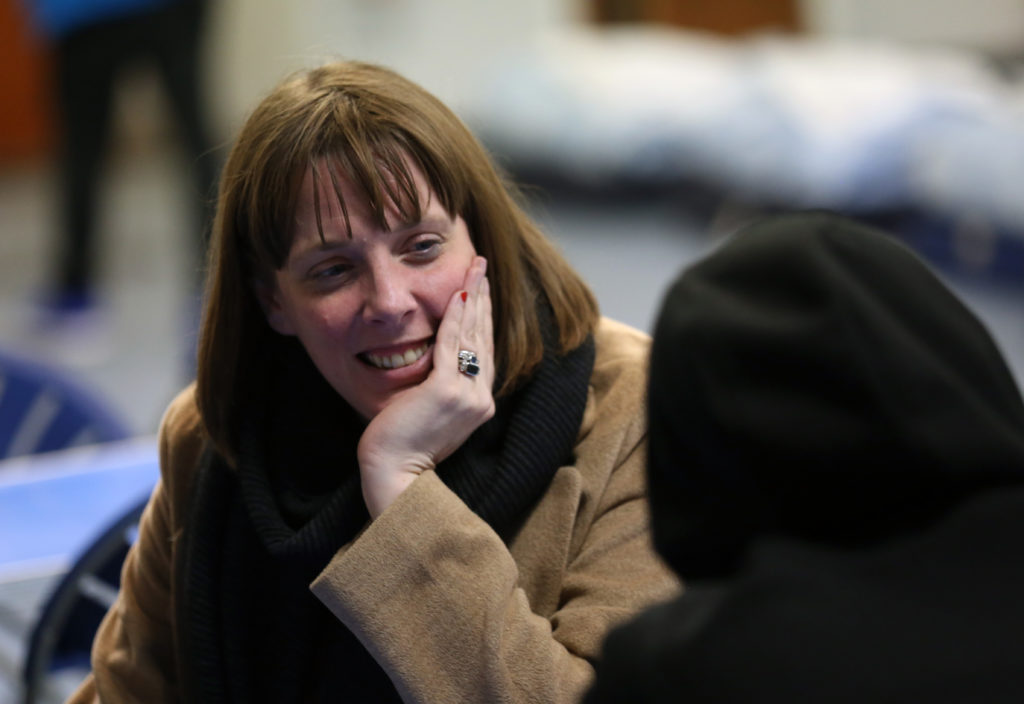
Jess Phillips arrives at a city centre homeless shelter on January 14, 2020 in Glasgow, Scotland. (David Cheskin/Getty Images)
So, in that tweet, the idea that I’m suggesting that trans women aren’t women is certainly not my intention. But we all have to live and learn.
The idea that I’m suggesting that trans women aren’t women is certainly not my intention. But we all have to live and learn.
In this conversation, we’ve all got to be able to make mistakes. And not just about trans issues – there’s so many things that people feel anxious about that we’re going to be able to progress on until we… It’s kindness. The really basic principle of just being kind to each other.
I always say that questions are fine, concerns are prejudiced.
Questions are fine! People…
…want to know, yeah!
And that’s about any sort equality group. I will find people want to ask you about things to do with abortion, to do with your periods, to do with where did you meet somebody if you’re in a multiracial couple.
Questions are fine.
Yeah, if you are polite and respectful and don’t ask anything you wouldn’t ask your nan… I always think that’s good advice as well.
Oh, my nan, you could ask her bloody anything! I’m not sure that’s standard. She’s an open women.
Jess Phillips vows to put reforms to the Gender Recognition Act ‘back on the agenda’.
Juno Dawson: Can we talk more about the GRA? Because I think actually one of your rivals, Keir Starmer, said that, particularly the GRA reform, has been used as a political Hacky Sack in that it’s been used by the Left to win over LGBT+ voters… But then, more recently, it’s been kicked so far into the long grass that I can’t really see it anymore.
Jess Phillips: Welcome to Boris Johnson having a majority of 80. I think that the amount of stuff that we’re going to be able to move forward on, especially in the equalities world, it seems untouchable at the moment. But I mean the GRA…
That’s why we met. We met [in Westminster] at a big cross-party conference when it was looking within sniffing distance at that point. It felt like everyone was on side and it was just around the corner, in fact.
I feel really proud actually of the last Labour government’s efforts in putting down, I think it was in 2004, at a time where this didn’t seem to be a conversation. Maybe we just weren’t all on Twitter quite so much in 2004?
At the time in 2004, that the Gender Recognition Act as it stands, was a groundbreaking piece of legislation.
All over the world. It was the first place that this piece of legislation would be enacted and lead the way in other places.
I feel really quite proud of that. But then, when we came to be doing the inquiry in 2015, ’16, it just didn’t seem fit for purpose. I vividly remember doing a scrutiny session with somebody. There was an organisation who were talking about this sort of test, the living in role test, and I’m sure it’s still about.
I had to go through it! It was the maddest thing.
I just kept saying to this person who was scrutinising: “So, I don’t understand, how would I live in role as a man? Would I wear trousers? Would I wear my hair short? I don’t understand, I don’t understand!”
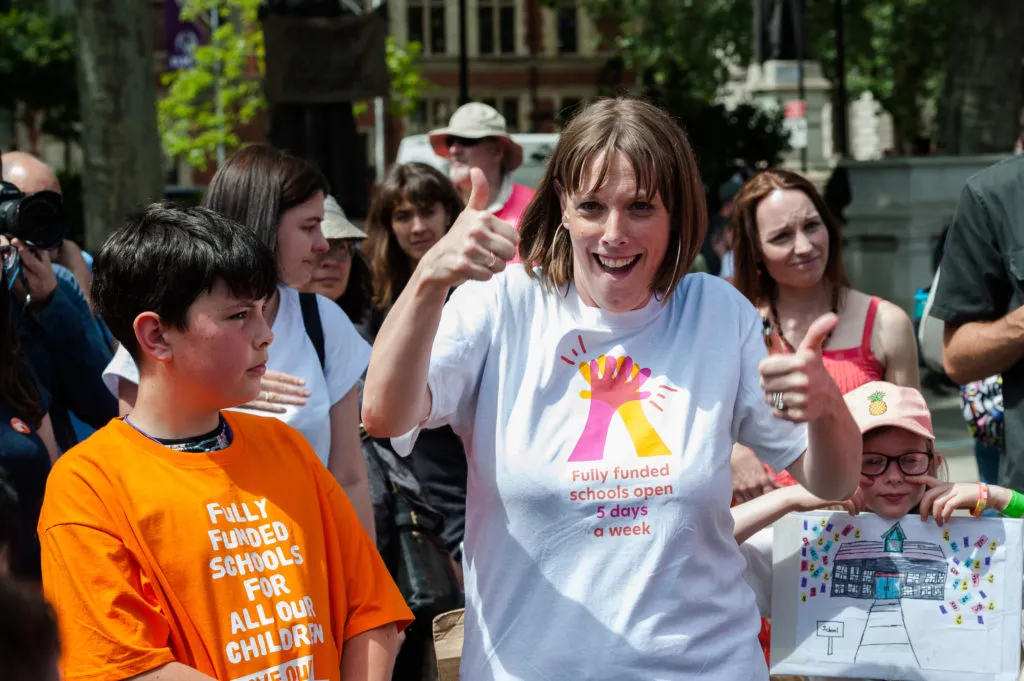
Labour MP Jess Phillips and her 10-year-old son Danny join hundreds of school children, their parents and campaigners from across the country in Parliament Square. (WIktor Szymanowicz/NurPhoto via Getty Images)
And they never see you. I went through this about 18 months so I could get married. I got this letter back from the Gender Recognition Council saying: “We can’t find any evidence that you were Juno in June 2016”. And I was like, “Oh, yeah, I had a month off,” you know, clearly that month.
That’s what we’re dealing with – with a panel of people that have never meet you, they just don’t know you. And I think we’re in a position now where there’s places like the Republic of Ireland; their rules about self-identification and gender recognition are so much further ahead than where we are in the UK.
I found that it was not fit for purpose in modern Britain at the time, because I don’t know how anyone could ever meet those tests or who, more importantly, gets to set the test.
As somebody who has spent her life arguing against the idea of like, boys jobs and girls jobs, I just couldn’t understand the parameters. So, the recommendations to change how that process happened seemed deeply obvious.
Under a Jess Phillips Labour Party, would the GRA get back on to the agenda?
Yes, absolutely. One thing I would say about a Jess Phillips – I always hate talking about myself in the third-person – government, equality would run through literally every standard.
One thing I would say about a Jess Phillips government, equality would run through literally every standard.
And not just the things that we’re talking about now, the obvious equalities laws that we should hold really dear in this country, but in every single decision made by government, that decision has to be made sure that it is being made for all.
I’ve spent my entire life in one way or another working for one disadvantaged group or fighting for equality.
The sky’s the limit on with regard to making sure that the world is fairer. That everybody can have things that so many people I work among just take for granted.
I’m glad you mentioned non-binary people as well because in the last round reviews, non-binary people was still left out in the cold.
Even our report, we did touch on the issue of non-binary, but it was specifically much more about trans rights and health.
There are some places, there’s some parts of North America now, a lot of places – Germany and Austria in Europe, Argentina, Australia – are now allowing non-binary people to call their gender as an ‘X’.
Do you think that’s something we should be exploring for this country?
Like on your passport and things?
Yeah.
It’s a bit like when the equal marriage stuff was going through and some Tory MPs basically saying this was going to make their marriage…
Invalidate.
Invalidate their marriage! The sky doesn’t fall in when you write ‘X’ on a passport.
Exactly. Why do we need gender on a passport anyway?
The sky won’t fall in if you put ‘X’ on a passport, if you put ‘X’ on a form. What we have to make sure, in any equalities legislation, is that there is proper monitoring.
People often say: “Oh, but the trouble is it will affect data gathering on issues like women’s health or men’s health or specific things.” But surely the system is able to cope enough with having the category of ‘X’ [on a passport]?
The sky doesn’t fall in when you write ‘X’ on a passport.
And that’s the thing in all these conversations about trans rights – we’re less than one per cent of the population.
And I think in particular in this country, the tabloid media, which brings me to my next question, has completely blown – and you’ve used the word yourself – these debates out of proportion. We had in the run up to the election, the tabloids felt quite one sided politically…
You’re gonna have to tell me what they were saying? I have to say, I live in a bit of a bunker in the lead up to an election where I’m just focused on knocking on people’s doors.
I will keep it on the issue of trans rights. Some papers, every single week, are reporting strongly negative stories about a very small minority.
I think in what has become a culture war, one thing that always worries me is this the source of the controversy. The source of the controversy, sometimes, is people suggesting that we have to remove the word “women” from things like sanitary products – there’s some controversy, I think I can recall, about a female sign being on sanitary products – and that we have to change the way that we talk about literally everything.
And no trans person that I have ever met has ever, ever asked for any of those things.
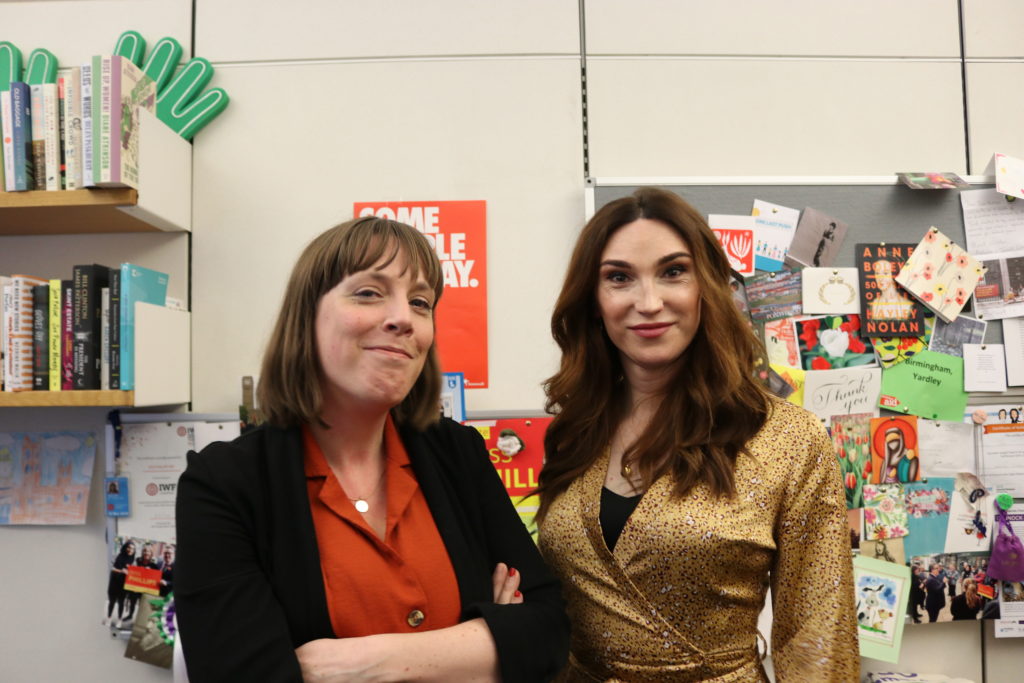
Labour lawmaker Jess Phillips (L) with Juno Dawson. (PinkNews)
It’s like “gender-neutral gingerbread people”. It’s a phrase that gets us started on these dog whistles. As trans people we’re just looking for the right to determine ourselves and the right to healthcare…
The source is really important. But like I say, no trans person I have ever met said that they didn’t want me to use the term “breastfeeding”, or to talk about my periods.
No trans person I have ever met said that they didn’t want me to use the term ‘breastfeeding’, or to talk about my periods.
And sometimes I worry that groups of people who, maybe – I think there’s good and bad intentions – have good intentions of inclusion, it creates a fight that is then being really, really damaging and ends up in the newspaper and is really, really damaging for trans people who’re just trying to crack on in life.
It’s people talking about us, not to us.
I have spent a huge amount of time, I’d say probably much, much more so than any of my rivals – although I don’t like the term particularly in this context – talking to different LGBT+ groups or working with different LGBT+ groups on this and many other things.
Never once has anyone ever said to me that if I talk about my womb, that it would be offensive, or if I talk about women having abortions, that that would be offensive. And yet, I’m told I have to fight against that. But I’m fighting against nothing. There is no there is no push.
The Department for Education left schools in Birmingham ‘high and dry’ amidst anti-LGBT+ education protests.
Juno Dawson: Well let’s talk about a fight that you did get involved with, about the schools near your constituency in Birmingham, when you were very, very vocal about the need for young people to receive appropriate education about LGBT+ lives.
Because I was thinking in the next 10 years anyway, we wouldn’t need to be having these conversations, because the younger generation will have been better educated… And so, thank you very much for speaking out so powerfully during that time. How are things now? Has that all calmed down?
Jess Phillips: I think that the answer to that question is, yes, it has calmed down. But only because of the efforts of… Not me, I was just one voice, but the real efforts of a collective of people.
Both LGBT+ people and their allies, and largely the strength of conviction of the head teacher and the staff at the school in question – at both, there was actually two schools where this really became a pinch point – and just the strength of conviction of those people has been genuinely inspiring to me as somebody who grew up in Birmingham and whose children are growing up in Birmingham.
They have been really inspiring and, I have to say, I think that the government left them a bit high and dry. It was half-measures what the Department of Education was saying.
There’s a simple way around this. In law, every child at every age, should receive age appropriate equalities education about every single group within the equalities act. The end.
In law, every child at every age, should receive age-appropriate equalities education about every single group within the equalities act. The end.
Amen.
What we were left with was them looking good on the principle – and bear in mind, [the government] had to be dragged there to even get to having PHSE sex and relationships education. It’s people like me, Stella [Creasy], Sarah Champion, Yvette Cooper… We’ve been dragging them there for years and they want to blow their trumpet about how brilliantly they’ve done on this.
And to be fair, we got there in the end.
In the end.
We got there in the end. However, they kept saying, “To get it through the House of Commons, we’re going to have to say head teachers are going to be allowed to have discrepancies.” To me, you cannot have discrepancies with regard to equalities law. There is no discrepancy.
That tiny little line which seems like nothing, that is what bred to what happened in Birmingham.
Those teachers deserve to be better protected. But what has been forgotten in all of this, funnily enough, is that it all became about whether people did or didn’t want their kids knowing about people having two mums.
That piece of legislation, it was fought for by people like me, about safeguarding children, to make them recognise what healthy relationships look like, and working for years and years, with people who’ve been sexually abused and women fleeing terrible violence, that was lost to bigotry.
That’s sad. I became a teacher in 2002 and did six years in the classroom and I always said that if – no offence to maths – but if we dropped one maths lesson we had mandatory PSHE going right through from five years old to 18 years old, we could do coercive control, we could do consent, we could do so much that hour; climate change citizenship.
Absolutely. In France, my brother’s brother-in-law is a philosophy teacher and they have mandatory philosophy, but it is essentially like being citizens of the world. And lots of people would be, “This is like total mumbo jumbo, the liberal chattering classes”, but it’s not the liberal chattering classes in that school in Birmingham.
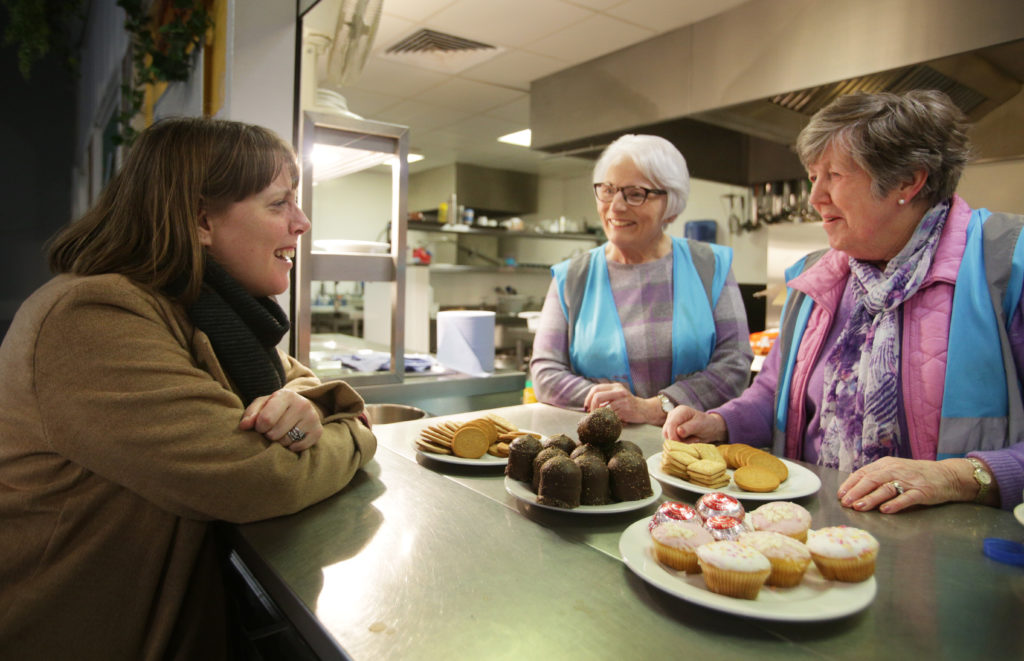
Jess Phillips talks to café staff after arriving at a city centre homeless shelter. (David Cheskin/Getty Images)
That is an inner city school in Birmingham where this became a very real issue.
There’s so much rhetoric at the moment about what a divided country we are and everybody’s in some Twitter spat or another – I’ve just been in Scotland and our Brexit argument up there is IndyRef two.
We talk so much about how divided we are as a country, and then if you look at the British attitude survey, and the amount of strides we’ve made forward on things like people’s attitudes towards LGBT+ people, there is good hopeful stories to be told out there about how people are much, much more tolerant than they’ve ever been. Much more.
And there are still battles to be had. I think we really need to celebrate the progress that can be made when people put in the effort.
I think we really need to celebrate the progress that can be made when people put in the effort.
Next question. I think the next question is the difficult question.
So, right after the election in December, you said that the Labour Party needs to do whatever it takes to get back into power. And some commentators have interpreted that to mean winning back this ephemeral traditional Labour voter who lives outside of London and has swung to the Tories at the last election.
And that’s worried some Labour voters, younger Labour voters perhaps, who might worry that that means sacrificing or throwing progressive voters under the bus. So, how can you do that? How can you, Jess Phillips, win both of those people?
That’s certainly not my intention. I don’t think that, in reality, the values of people who vote Labour are un-progressive, and even those who just voted Conservative for the first time maybe – or have been on a journey through other political parties – I don’t think that those people are anti-progress on equalities. Those people just want to be able to trust a political party to deliver the things that they and their families need.
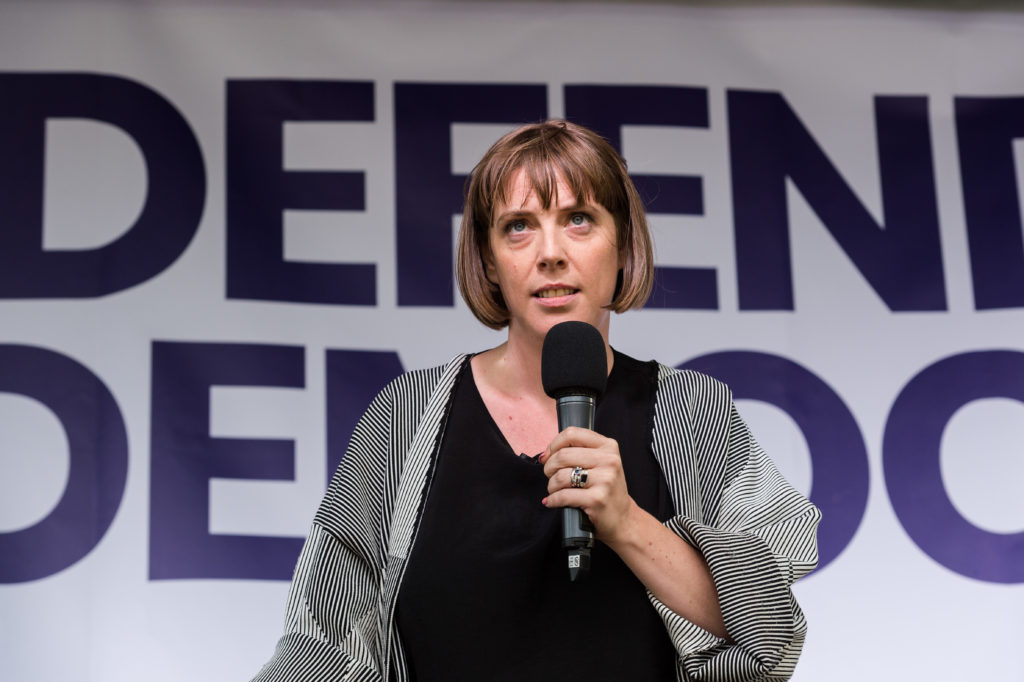
Labour Party MP Jess Phillips speaks to thousands of pro-EU demonstrators gathered for a cross-party rally in Parliament Square, organised by the People’s Vote Campaign. (WIktor Szymanowicz/NurPhoto via Getty Images)
Whether that’s jobs, housing, safety and security, because you know, for lots of lots of the country just feels like they don’t feel safe on their streets.
But absolutely no one, and I’m sure every single Labour candidate in an election of any sorts – council, county council – would ever would want to be part of a political party that wasn’t just about progressive change. Equality is as rooted in the Labour Party… it is basically its entire thing; solidarity with each other.
Equality is as rooted in the Labour Party… it is basically its entire thing, solidarity with each other.
That is, to me, what I hear when I hear, that is equality.
So, and I don’t think the people at Northern towns don’t want to see progress on race relations, don’t want to see progress on LGBT+ rights. That’s certainly not my experience of being from the Midlands and the North.
My mum was from Bradford and she has a trans daughter.
Exactly! We’ve got to be really, really careful that we don’t paste ideas onto huge groups of the population that simply don’t recognise them.
And also, people aren’t all the same. The Midlands and the North thing, and the Red Wall thing, it really, really annoys me – as if everybody’s like a homogenous group.
The Wildlings from Game of Thrones…
Exactly, like we’re beyond the wall… that people all feel and think the same.
There are as many people in what we now term Labour heartlands who would be out on the frontline in a Pride march, on the frontline if somebody lost their job because they were pregnant, as there are in London. The argument is won.
Every Labour leader would always try and progress so that equality is at the heart of it. If I thought it would win votes to throw women under the bus or to throw any group under the bus, they’re not votes that you would want. It’s not an either/or.
If I thought it would win votes to throw women under the bus or to throw any group under the bus, they’re not worth votes that you would want.
Jess Phillips doesn’t want anyone who’s being paid for sex to end up ‘criminalised’.
Juno Dawson: The other sticking point in this leadership election, when you when you Google “Jess Phillips”, has been about your previous support for a Nordic model regarding sex workers, and obviously LGBT+ people statistically are more likely to wind up doing sex work for lots of different reasons.
In my time in parliament I will fight for Nordic model here in the UK https://t.co/07YnOezOXq— Jess Phillips MP (@jessphillips) November 10, 2015
But some recent research from Northern Ireland showed that in the Nordic model, women felt they were being criminalised more than have ever been. And they said, in terms of attitudes, they felt less safe than they felt before, during the trial, in and around Belfast.
So, since that work has come in, where are you standing on sex workers rights now?
Jess Phillips: Look, I ran a service for victims of human trafficking for five years.
The things that I have seen… Not just of people trafficked into this country but vulnerable women – and vulnerable men, although, largely, the vast majority of it is women – with nowhere else to turn, who are substance-dependent, who have been horrendously exploited.
And I’m afraid to say lots and lots of people who enter into that… Well, they don’t “enter into it”, lots of people who are exploited are exploited from childhood upwards.
The reality for me is that I will never think that a person procuring sex is the same as consent and the level of exploitation in sex work or prostituted women is not something that can be ignored.
What we can’t end up with is an either/or. I don’t want to see anyone who is exploited, or anyone who finds themselves in a situation where they are being paid for sex, to end up criminalised, first and foremost.
I don’t want to see anyone who is exploited, or anyone who finds themselves in a situation where they are being paid for sex, to end up criminalised, first and foremost.
I want to make sure that where those people have a safe route out.
And safety is really, really important. I still very much believe that a model where we criminalise people who think it’s OK to buy sex is the one that I would favour.
It’s funny because on the Left this gets talked about a lot. There is no other area where we think that the sort of capitalist hand of the market is right except in sex work. And the argument that people can be for sale, that people’s sexual consent can be for sale… I’ve worked with women who were kept in a room and forced to have sex with 20, 30 men in a day.
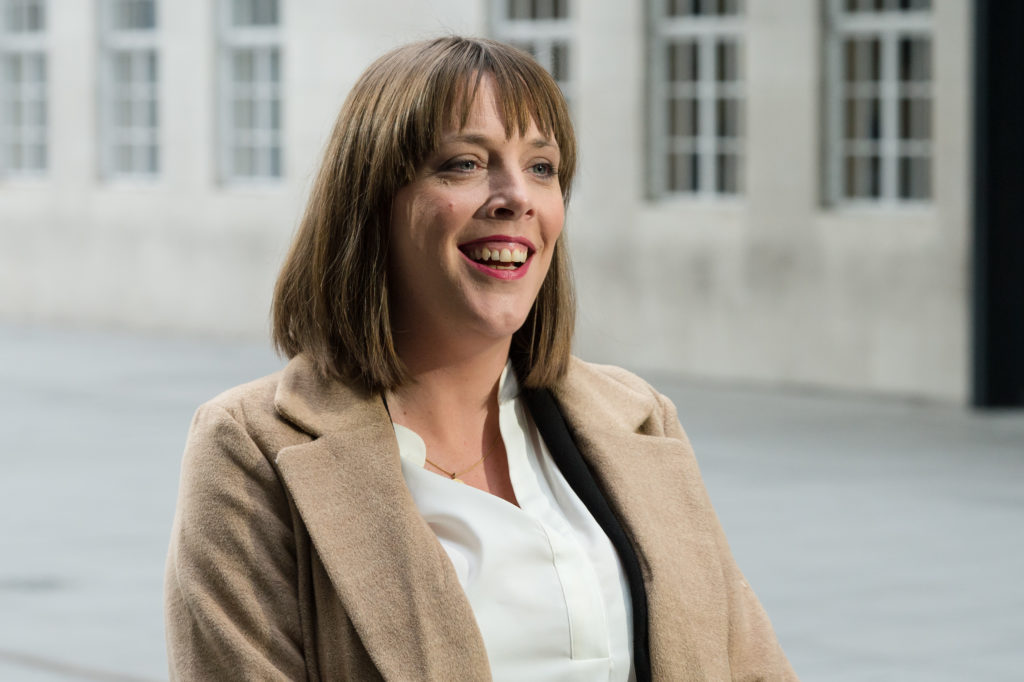
Labour Party MP Jess Phillips speaks to the media outside the BBC Broadcasting House in central London. (WIktor Szymanowicz/NurPhoto via Getty Images)
That harrowing story about all those Vietnamese people dead on that lorry, the real face of human trafficking in this country is not seen at all. And as somebody who has worked for years, to end the exploitation, to end the idea that women’s bodies are the thing that defines them and can be bought, and the idea that consent can be bought; I’m never going to think that that’s OK.
We would never, in any sort of risk-based criminal employment… So, drug dealing, we would never have the same arguments about young boys in estates running county-lines, gangs, that we just have to make them safer to do the dangerous thing. We would never have that. We shouldn’t have it about a perceived work that exploits women.
And my last question for this morning and I think this one should be quite straight-forward is about PrEP, about medical treatment.
Oh! I thought you meant, like, prepping for debate.
No, no, the drug! Pre-exposure prophylaxis which, just this week, the health secretary Matt Hancock said: “Prevention is better than cure.” And, yet, he hasn’t rolled-out nationwide this drug which could make sex a lot more fun and a lot safer for a lot of gay and bi men and trans women who are the highest risk groups for HIV.
And you can get it in Scotland, but not the rest of the UK. That is just outrageous
Prevention is better than cure 👇 https://t.co/CVKpNDWOVo— Matt Hancock (@MattHancock) January 10, 2020
Of course they should roll it out. I’m not sure that many government policies have ever been about making sex good.
As carefree as it is for straight people.
Safe!
Yes, safe! There you go.
I like the idea that the government should have policies on people enjoying sex, that’s an entertaining idea. But absolutely, it’s no question that it should be rolled out. And I actually don’t know what the sticking point is.
We, very similarly, went through sort of terrible sort of small moves of progress around termination pills for pregnancy, having to be done in hospital rather than being available over the counter, and I could never understand the health secretary at the time, it was Jeremy Hunt, that his objection was anything other than ideological.
It was nothing to do with safety. It was nothing to do with risk. It was nothing. All those tests have been met about whether it was good for people’s health – those tests have been met. And so it seemed it was just ideological and in this instance, it does just seem… And that is ridiculous. If it’s going to make people safer and healthier, Of course, it should be done.
It works! all around the world it’s working. And finally, do you have a message for LGBT+ people who might be reading this at work or on the train right now?
My message would be that I’ve spent my entire life fighting for equalities. That wouldn’t ever change. Sometimes, in the fight for equalities, sometimes it means literally striding out and taking on a battle. Sometimes that can be misconstrued. What you should want in any future leader is not someone who’s going to parrot a line that’s been given to them by an advisor on this issue, but someone who’s heart is constantly in the game in making sure this country is fairer and everyone has equal rights.

